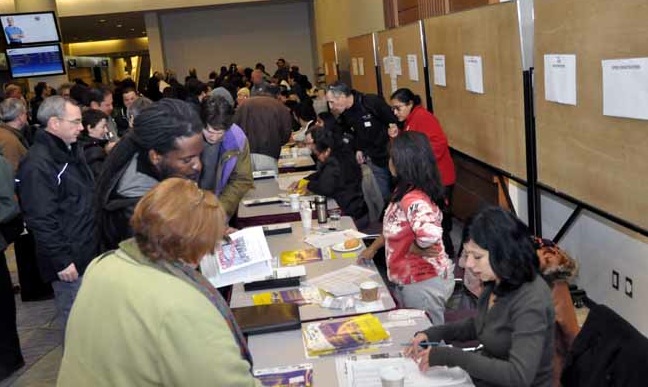With over 1,000 delegates in attendance representing over 36 organizations ranging from a strong contingent of organized labour combined with numerous community, social service and environmental groups, last weekend’s Good Jobs for All Summit (GJAS) held at the Metro Convention Center in Toronto was a trailblazing success that ignited a new alliance of like-minded constituencies.
Coming on the heels of the New Living Wage Report that was also released last week by the Canadian Centre for Policy Alternatives (CCPA) in cooperation with the Good Jobs Coalition, the GJAS had two main messages for governing political parties both federal and provincial.
The first: don’t believe that you can fix the ailing economy on the backs of the working class. Unionized workers are not interested in giving up on pensions and benefits that have been hard won over years of negotiations in both the public and the private sector.
And, secondly, the way to a better future is to follow the green-brick road toward the creation of new jobs within an environmentally sustainable manufacturing base.
Deena Ladd, co-ordinator of the Workers’ Action Centre, an organization that is on the front lines assisting new Canadians, told the delegates, “Workers are being told that the economy is in crisis and that everyone will have to get ready to tighten their belt. I tell you there are no more notches on the belt!”
She went on to say that the world of work today is fast degenerating into a short-term (often part-time) universe where people are regularly given job security for only three to six months at a time with little or no benefits.
“We are all being turned into, and I quote, ‘independent contractors’ so that company’s can avoid paying even the most minimal workplace benefits.”
David Foster is currently executive director of the BlueGreen Alliance, an organization that began as a strategic national partnership between labour unions and environmental organizations in order to expand the job-creating potential of the new green economy. Formerly a district director with the United Steelworkers, Foster called for the creation of a “new urban agenda that will build a clean energy economy that is capable of renewing our manufacturing base,” and further noted, “Green jobs are just blue collar jobs with a green purpose.”
But Foster cautioned president-elect Barack Obama against bailing out the private sector while leaving in place the same echelon of executives and management personnel that created the problem.
“This would be a huge mistake,” Foster said. “Barack Obama pledged 150 billion dollars toward the creation of jobs and clean energy investments in spite of the failing economy – this is a bold and creative move signaling a whole new direction.”
The final keynote address was delivered by Maria Elena Durazo, executive secretary-treasurer for the Los Angeles County Federation of Labour, AFL-CIO. Sister Durazo is the daughter of Mexican immigrant farm workers and has a long history in the labour movement. She most recently served as national co-chair for Barack Obama’s presidential campaign.
Durazo said that organized labour put in “a huge mobilization effort for the Obama campaign involving door to door canvassing and literally millions of phone calls.” She went on to explain that this experience also allowed the labour movement to hear back from the people – both those who were members of unions and those who were not.
“We heard from people about how they needed health care, and home care and all of the other cares that effect low to middle income people.”
She emphasized that no union should be made to stand alone at this critical time in history. “Especially an organization like the autoworkers. We must not allow them to be saddled with a two-tier wage and benefit package.”
During the day, delegates broke into workshop sessions coordinated by summit organizers Jojo Geronimo, Tam Goossen and Winnie Ng that centered on issues such as: skills, training and professional development; community and economic development; immigration policy and labour; employment equity and other topics.
By the day’s end, the final plenary of the summit considered various goals and objectives with which to go forward. John Cartwright, president of the Toronto and York Region Labour Council, told the assembly that their work had produced “a historic crossroads for a new movement in this country.”
The recommendation receiving the most applause and shouts of approval was stated simply: “to use this experience as a model for future summits in order to build this alliance across the country.”
©2008 Robin Breon



